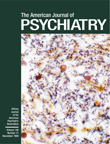To the Editor: I thank Rachel Yehuda, M.D., and colleagues for their excellent structured clinical assessment of trauma exposure, posttraumatic stress disorder (PTSD), and other psychiatric disorders in a group of adult offspring of Holocaust survivors and demographically matched comparison subjects
(1). The methodological soundness of their study, which addresses the selection bias criticism of previous studies
(2), supports the validity of their finding that there are adverse effects in the offspring of Holocaust survivors compared to a comparison group.
How might their data generate further research? How might it begin to inform our clinical work and health care policy? We need to further progress from the belief that PTSD only occurs as a natural response to horrendous events. We need to further research why some individuals develop PTSD and others do not
(3).
As Dr. Yehuda and colleagues emphasize, defining groups at high risk for PTSD furthers this research because the subsequent study of these high-risk groups “permits more effective identification of vulnerability factors.” Likewise, studying low- or nonrisk groups—i.e., those who are exposed to a traumatic event but do not develop PTSD or thrive regardless or because of the experience—would be enlightening. The data presented in Dr. Yehuda and colleagues’ article are hypothesis generating and beg further research.
On one hand, the children of Holocaust survivors, versus the comparison subjects, have a significantly higher current and lifetime prevalence of PTSD and other psychiatric disorders. What would explain this difference? There was no significant difference of lifetime traumatic events between the offspring and comparison groups. The findings of this study demonstrate a higher vulnerability in the adult children of Holocaust survivors. What would cause this vulnerability? What degree of the variance might be genetic versus nongenetic? What is the mechanism of the nongenetic intergenerational transmission that might produce this vulnerability? Future studies could test various hypotheses. Although in this study, “all subjects were born at least 1 year after the end of World War II,” and seven offspring had only a father who was a survivor, are there intrauterine effects of maternal exposure to a traumatic event and its aftermath during gestation that sensitize the fetus? Do these parents lack the ability to sufficiently nurture their children because of the effects of the Holocaust on themselves? To explore these questions, we need to have data on the characteristics of the parents
(4). Is the transmission effected through learned behavior? Are the children traumatized by hearing parental stories of the Holocaust and witnessing the chronic suffering of their parents? In this study, there was no comparison group consisting of offspring raised apart from their Holocaust survivor parents by individuals who were not Holocaust survivors.
On the other hand, why do 69% of the offspring (a high-risk group) not develop PTSD? What is different about this subset of the offspring group compared to the subset that develops PTSD? What is protective for them? Furthermore, that there are “those for whom a non-life-threatening event was the most distressing although there was a life-threatening event” (comparison group and offspring group 2) is fascinating. Why would someone who experienced a life-threatening event endorse a non-life-threatening event as being more distressful? What might we learn from this group about subjectivity and cognitive appraisal of the experience of both stressful and traumatic life events?
Regarding clinical implications, this study underscores the importance of screening questions during initial psychiatric assessments that not only ascertain whether a patient has experienced trauma but also whether a patient’s parents have experienced trauma. Undoubtedly, we must consider intergenerational factors in understanding and treating our patients.
Finally, Dr. Yehuda et al.’s study and studies like it remind us about the importance of allocating health care dollars and developing prevention and treatment programs for high-risk groups vulnerable to developing PTSD.

